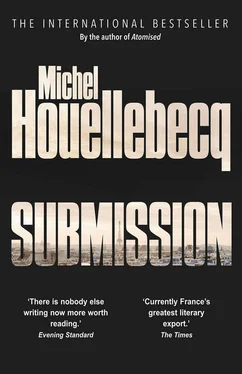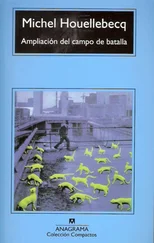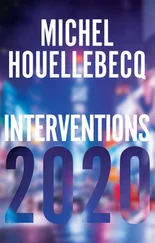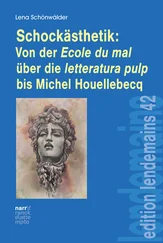A few more months went by. My dyshidrosis eventually went away, but it was replaced almost immediately by an extremely violent outbreak of haemorrhoids. The weather grew colder and colder, my movements more and more predictable: one outing per week to the Géant Casino, for stocking up on food and for conversation, and a daily outing to the mailbox to collect the books I ordered on Amazon.
Even so, I got through the holidays without excessive despair. The year before, I had still received a few Happy New Year emails — from Alice, in particular, and a few university colleagues. This year, for the first time, nobody wrote.
The night of 19 January, I burst into unexpected, uncontrollable tears. In the morning, as dawn rose over Le Kremlin-Bicêtre, I decided to return to Ligugé Abbey, where Huysmans had taken his monastic vows.
The TGV to Poitiers was delayed indefinitely, the announcement said, and railway security guards fanned out over the platforms so that no one would be tempted to light a cigarette. The trip was beginning badly, in other words, and new inconveniences awaited me on the train. The luggage area was even smaller than it had been the last time I took the TGV. It was now practically non-existent. Suitcases and bags lay piled up in the corridors, so that moving from one carriage to another — previously the main attraction of travel by rail — was difficult and soon became impossible. The Servair buffet car, which took me twenty-five minutes to get to, held more disappointment: short as the menu was, most of the items were unavailable. The national rail service and Servair apologised for any inconvenience. I had to settle for a quinoa salad with balsamic dressing and an Italian sparkling water. At the station I’d bought a Libération , more or less in desperation. One of the articles ended up catching my eye around the time we reached Saint-Pierre-des-Corps. Apparently, this distributism of the new president’s wasn’t as harmless as everyone had thought. One pillar of Chesterton and Belloc’s philosophy was the principle of subsidiarity: that no entity (social, financial or political) could take charge of any function if it could be handled by a smaller entity. Pope Pius XI defined the principle in his encyclical Quadragesimo Anno : ‘Just as it is wrong to withdraw from the individual and to commit to the community at large what private enterprise and endeavour can accomplish, so it is likewise unjust and a gravely harmful disturbance of right order to turn over to a greater society of higher rank functions and services which can be performed by lesser bodies on a lower plane.’ In this case, the function newly considered a ‘disturbance of right order’ was the welfare state. What could be more beautiful, Ben Abbes enthused in his latest speech, than to see welfare where it belonged, in the warm setting of the nuclear family. At the time, the ‘warm setting of the nuclear family’ was still mainly a programme , but in concrete terms, the new budget projected an 85 per cent reduction in welfare benefits over the next three years.
The really surprising thing was that he’d lost none of his hypnotic magic. Even now, his projects met with no serious opposition. The left had always been able to make cuts in social spending that the right never could, but this was even more true of the Muslim Party. In the international pages, I saw that the negotiations to bring Algeria and Tunisia into the EU were proceeding apace, and that by the end of the year both countries would, with Morocco, become European states. Preliminary talks had begun with Lebanon and Egypt.
Things started to look up when we got to Poitiers. There were plenty of taxis, and the driver didn’t blink when I asked him to take me to Ligugé Abbey. He was middle-aged and heavyset, with soft, thoughtful eyes. He drove his small Toyota very carefully. Every week, he told me, people came from all over the world to stay there, in the oldest Christian monastery in the West. Just last week he’d driven a famous American actor — he couldn’t think of his name, but he knew he’d seen him in the movies. (A brief enquiry established that the person he had in mind was probably, although not certainly, Brad Pitt.) He trusted that I would have a very pleasant stay: it was so peaceful, and the meals were delicious. As he said it, I realised that he was expressing not just a belief, but a hope, because he was one of those people, and you don’t see them every day, who take an instinctive pleasure in the happiness of their fellow men — that he was, in other words, nice .
Off to the left of the entrance hall was the monastery shop, where you could buy monastic handicrafts — but the shop was closed right now, and there was no one at the reception desk to the right. A small sign instructed visitors to ring for assistance, but asked that they refrain during the daily offices, except in case of emergency. There was a timetable, but it didn’t say how long the offices lasted. After a fairly lengthy calculation involving mealtimes, I concluded that for everything to fit in one day, each office probably couldn’t take longer than half an hour. A shorter calculation revealed that right then we were somewhere between Sext and None, so I could ring.
A few minutes later, a tall monk appeared wearing a black habit. His face lit up when he saw me. He had a high forehead, dark brown curly hair with hardly any grey, and a dark brown beard. He couldn’t have been a day over fifty. ‘I’m Brother Joel,’ he said, and hefted my bag. ‘I’ll take you to your room.’ He stood up very straight and carried my bag easily, although it was heavy. Clearly, he was in excellent shape. ‘It’s good to have you back,’ he went on. ‘It’s been more than twenty years, hasn’t it?’ I must have looked confused. ‘Didn’t you stay with us twenty years ago?’ he asked. ‘You were writing about Huysmans?’ It was true, but I was amazed that he remembered me. I had no memory of him at all.
‘You’re what they call the guest master, aren’t you?’
‘No, no — but I used to be. That job tends to be given to the younger monks, or I should say, the ones who are new to monastic life. The guest master speaks to our guests, he’s still in contact with the world. It’s like a sort of airlock, or a halfway step, before the monk takes the plunge into his vocation of silence. I did it for a little more than a year.’
We were walking alongside a quite beautiful Renaissance building, surrounded by a park. A dazzling winter sun sparkled down on the tree-lined paths, which were strewn with dead leaves. A church stood in the distance, slightly taller than the cloister, late Gothic in style. ‘That’s our old church, the one Huysmans knew,’ said Brother Joel. ‘But our community was dispersed by the Combes laws at the turn of the century, and when we finally managed to reassemble, we couldn’t get the church back, only the cloister buildings. We had to build a new church inside the monastery itself.’ We stopped in front of a small one-storey building in the same Renaissance style. ‘Here’s our guest house,’ he was saying, when all at once a sturdy monk, maybe forty years old and wearing the same black habit, came hurrying down the path. A vigorous man, with a head so bald it practically gleamed in the sun, he projected extreme serenity and competence. He called to mind a finance minister — he even looked a bit liked Pierre Moscovici — or better yet a budget minister, someone, in any case, who inspired automatic and limitless trust. ‘And here is Brother Pierre, our new guest master. He’ll be handling all the logistics of your visit. I just came to welcome you back.’ He bowed, shook my hand and walked off towards the cloister.
‘You came on the TGV,’ asked the guest master; I said I had. ‘It’s fast, all right, the TGV,’ he went on, clearly hoping to start us off on a basis of mutual agreement. Then, taking my bag, he led me to my room. It was roughly three metres square, hung with light grey, textured wallpaper. The carpeting was medium grey and threadbare. The only decoration was a large crucifix of dark wood hanging above a small single bed. I immediately noticed that the sink had separate taps for hot and cold, and that there was a smoke detector on the ceiling. I told Brother Pierre that the room would be fine, but I already knew that wasn’t true. In En route , when Huysmans debates — more or less interminably — whether he can stand monastic life, one of his negative arguments is that, apparently, they wouldn’t let him smoke indoors. Moments like that have always made me love him. There’s another passage where he writes that one of the few pure joys in life is getting into bed with a stack of good books and a packet of tobacco. Huysmans never had to deal with smoke detectors.
Читать дальше







